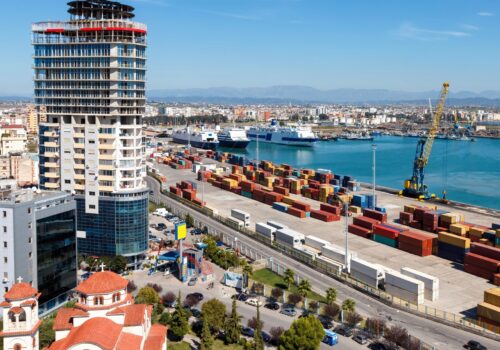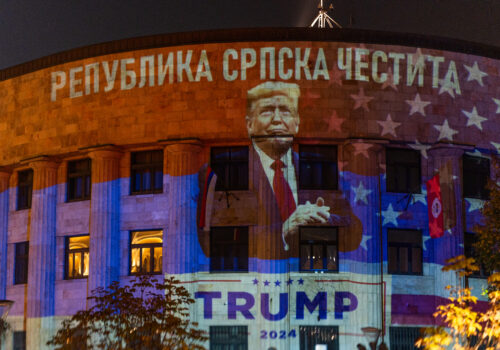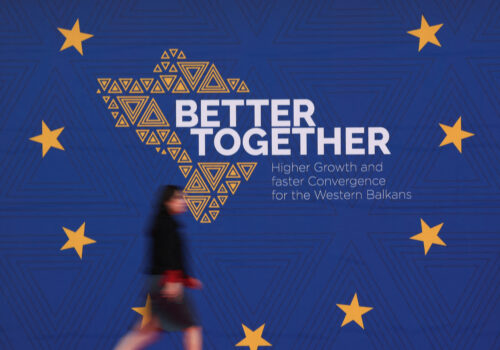The Atlantic Council Europe Center hosted the 2025 edition of the Southeast Europe Transatlantic Economic Forum, together with the Transatlantic Leadership Network, which took place in Washington DC on Wednesday, May 21.
This annual full-day conference is an opportunity to hear from policy-makers and experts on the most pressing issues for the US-Southeast Europe relationship and to craft a public dialogue to address these issues, hearing from the perspectives of business leaders and government officials from the United States, the Western Balkans, and wider SEE region.
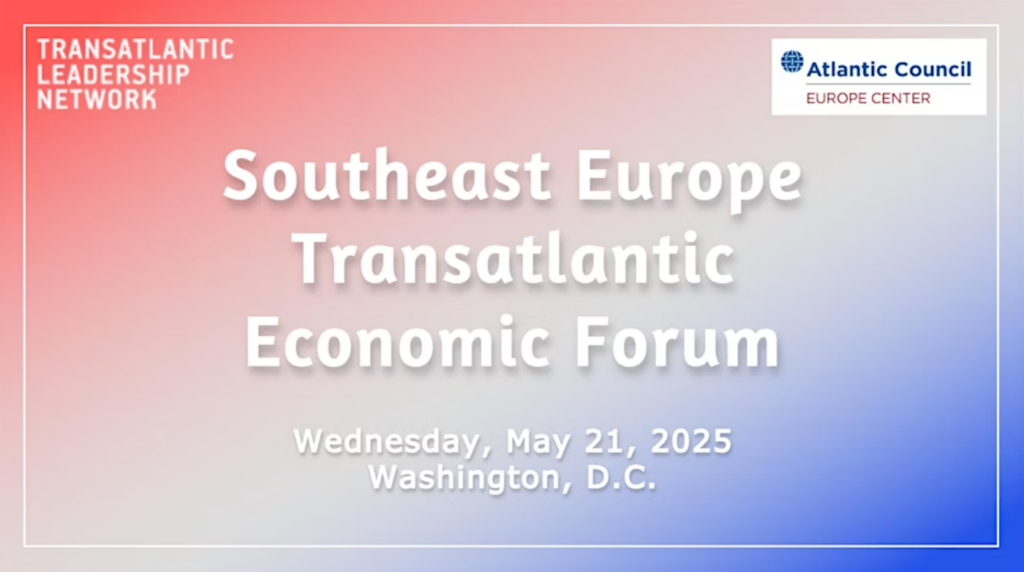
Agenda
Session I
9:30 a.m. – 11:00 a.m. ET Strengthening Transatlantic Alliances Through Business Cooperation: Next Steps?
Strahinja Matejić, Associate Director, Eurasia Group
Andrej Poglajen, Member of Parliament of the Republic of Slovenia
Amb. Philip Reeker, Partner, Europe Practice, Albright Stonebridge – DGA Group
Moderator: Ms. Lisa Homel, Associate Director, Europe Center, Atlantic Council
Session II
11:15 a.m. – 11:25 a.m. ET Southeast Europe – US: Enhancing Transatlantic Cooperation
Keynote remarks by:
Vladimir Lučić, Chief Executive Officer, Telekom Serbia
Session III
11:25 a.m. – 12:30 p.m. ET Energy Diversification: Obstacles and Opportunities
Amb. John Craig, Senior Fellow, Transatlantic Leadership Network; Senior Partner, Manaar Energy Associates
Fred Hutchison, Chief Executive Officer, LNG Allies
Laura Lochman, Acting Assistant Secretary of State, Bureau of Energy Resources, US Department of State
Moderator: Olga Khakova, Deputy Director, European Energy Security, Global Energy Center, Atlantic Council
Session IV
12:45 p.m. – 1:00 p.m. ET Montenegro: At the doorsteps of the EU membership
Keynote remarks by:
Aleksa Bečić, Deputy Prime Minister of Montenegro
FULL TRANSCRIPT IN ENGLISH
It is my honor and privilege to address you on behalf of the Government of Montenegro, a country rich in a history of resistance, statehood, and pride, and a people who have never forgotten their identity, no matter how much time has passed or how many borders have changed.
Montenegro and the United States have been bound by over a century of friendship. As early as 1905, President Theodore Roosevelt recognized the strength, dignity, and freedom-loving spirit of our nation. Today, as allies within NATO and partners in the fight against organized crime and the preservation of international security, we reaffirm that this partnership has both purpose and a future.
On this day, May 21, as we celebrate nineteen years since the restoration of our independence, Montenegro stands at a historic turning point. Our strategic orientation is clear: by 2028, Montenegro aims to become the 28th member of the European Uniop. We are proudly advancing toward this goal under the mandate of this Government. The facts speak for themselves: Montenegro is the only EU candidate country that has opened all negotiation chapters, closed six chapters, and received a report on meeting the interim benchmarks in the key Chapters 23 and 24, which focus on the rule of law and security. As one of the few candidates fully aligning its foreign and security policy with that of the EU, Montenegro holds a leading position, undeniably the most advanced candidate and the next in line to join the European Union.
The foundation of this path is a resolute fight against organized crime and corruption. As Deputy Prime Minister for Security and Coordinator of the Intelligence-Security Sector, I am particularly proud of this effort.
The recognition of these efforts is evidenced by the “Champion of the Fight Against Corruption” award, bestowed by the U.S. State Department in late 2023 to Montenegro’s Chief Special Prosecutor.
For the first time in Montenegro’s history, we are conducting a form of vetting within the Police Administration, thoroughly examining the integrity, assets, contacts, and lifestyles of every police officer.
Out of 3,500 officers, approximately 100 have been suspended in recent months alone. Hundreds of additional security checks, procedures, operational analyses, and audits are underway, all with a single goal: to ensure that the police badge is worn only by those who carry it with honor.
No fight is serious unless it begins within one’s own system. We have had the courage to start there. For the first time in modern Montenegrin history, the law applies even to those who, until recently, interpreted it at their own discretion.
The excellent cooperation and trust between the security sector, competent prosecutors, and our international partners-where we have received significant support from our American friends-have led to historic results in the fight against crime. Over 2,000 prosecutions of organized crime group members and persons of operational interest, the arrest and prosecution of leaders and high-ranking members of drug cartels, a twelvefold increase in results in combating economic crime, historic seizures and returns of weapons and ammunition, and hundreds of arrested, prosecuted, or suspended police officers all testify to our determination to rid the state of crime and corruption.
Today, Montenegro is becoming a country where the law has both strength and authority. A country where the question is not “who are you?” but “what have you done?” A country where it is clear that the law is the boss, not the head of a clan.
Never again will organized crime stand above the state, above the law, or above the citizens. Today, Montenegro is becoming a country of justice and fairness. A country where verdicts have been delivered or indictments confirmed against two presidents of the highest judicial institutions, two directors of the Police Administration, the director of the National Security Agency, the chief and special state prosecutors, the director of the Agency for the Prevention of Corruption, and numerous other officials and officers.
Montenegro is becoming a country with no untouchables. A state firmly committed to peace and international stability. We confirm this commitment through concrete contributions within NATO, the modernization of our defense system, and participation in missions and battle groups. This contribution is further strengthened by a strategic investment: the construction of two patrol vessels in France, which will joir:i the Navy of the Armed Forces of Montenegro. These vessels are not merely a technical upgrade for our country; they symbolize our role as a reliable guardian of Adriatic security, in the interest of the entire Alliance.
For only a state free from crime, a state with strong institutions, a state where the rule of law prevails over fear, can be a strong international partner. Montenegro aspires to be that state. And we believe that, with the support of the United States, we can achieve this.
On behalf of all the citizens of Montenegro, I deeply thank you for that support. I am confident that everything we achieve together will benefit not only our peoples but also the future we jointly safeguard.
Long live the friendship between Montenegro and the United States!
Session V
2:00 p.m. – 3:00 p.m. ET Empowering entrepreneurs: Driving integration convergence and innovation in Southeast Europe
Eric Hontz, Director, Center for Accountable Investment, CIPE
Bogdan Gecić, Founder and Partner, Gecić Law & Associates
Ilva Tare, Resident Senior Fellow, Europe Center, Atlantic Council
Moderator: Amb. John B. Craig, Senior Fellow, Transatlantic Leadership Network
In Partnership With
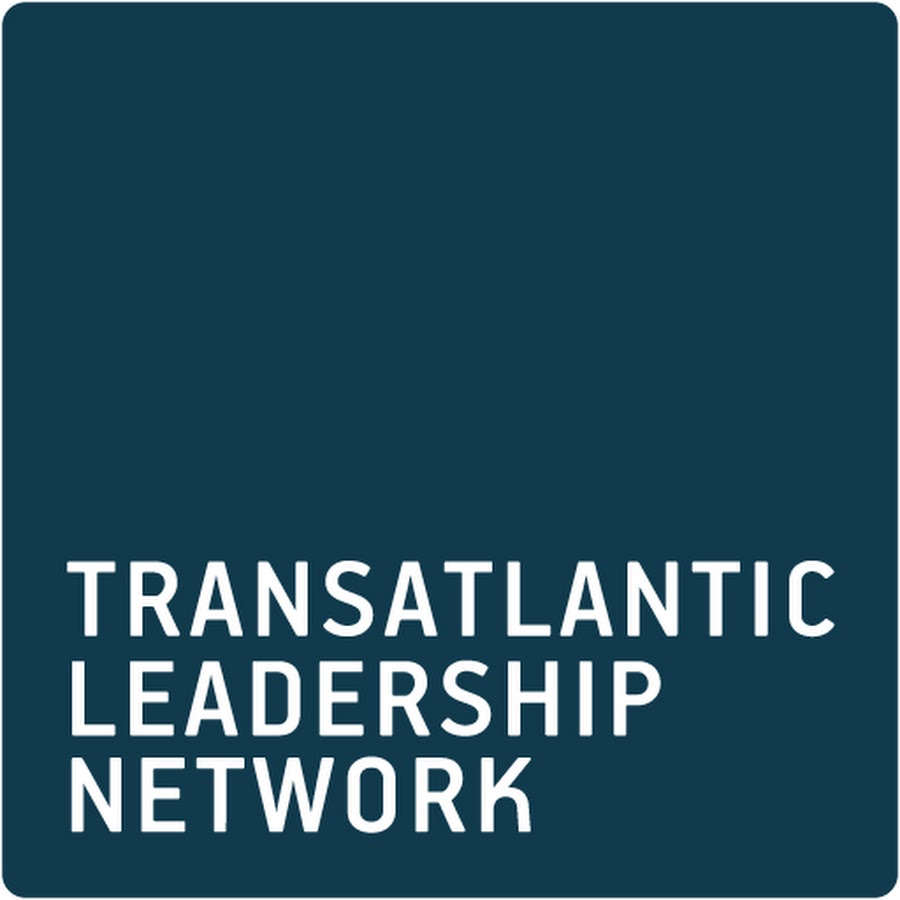
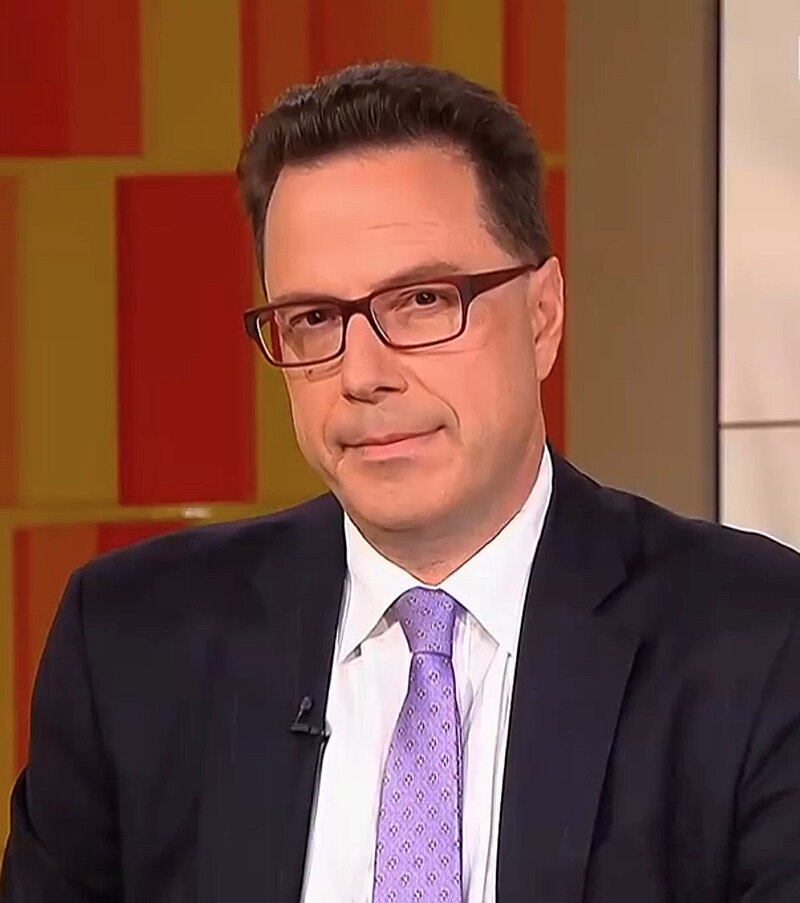
Sasha Toperich
Executive Vice President
Transatlantic Leadership Network
Related Reading

The Europe Center promotes leadership, strategies, and analysis to ensure a strong, ambitious, and forward-looking transatlantic relationship.
